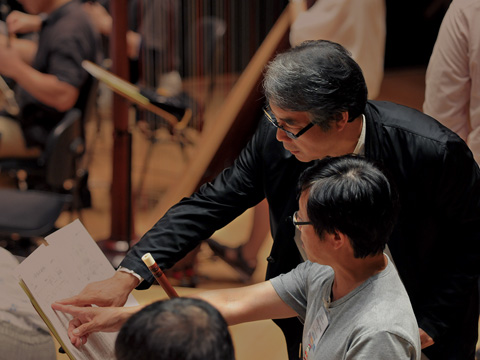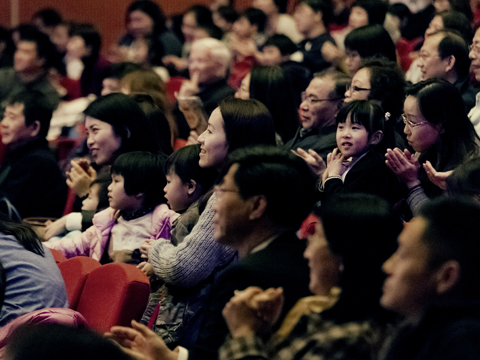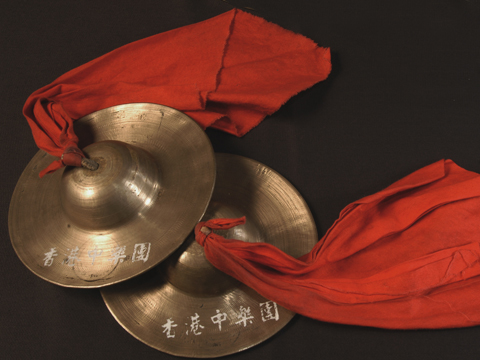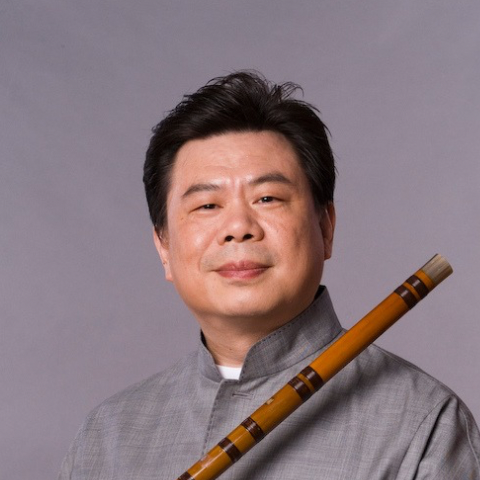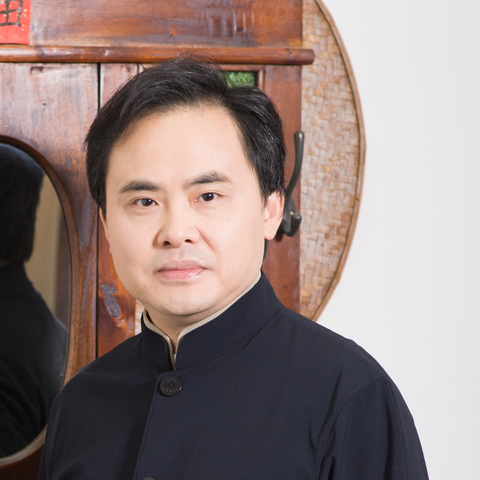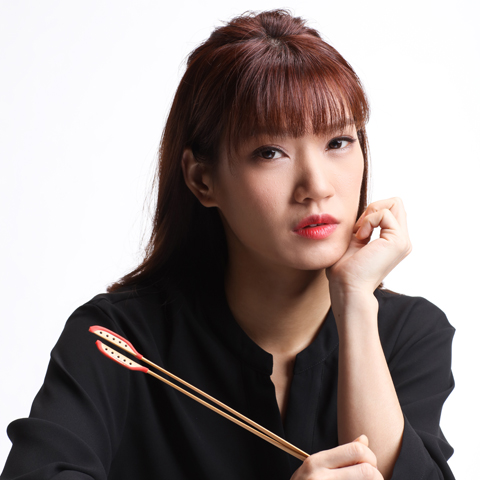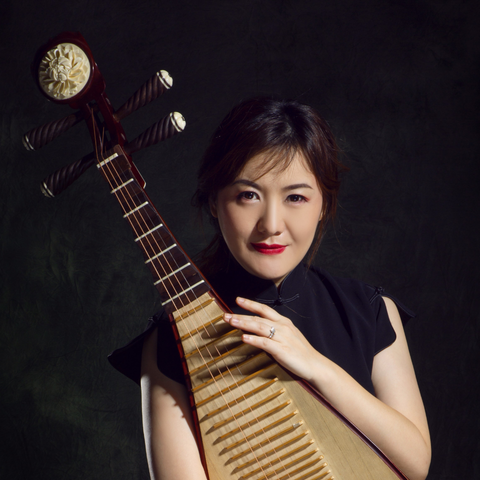
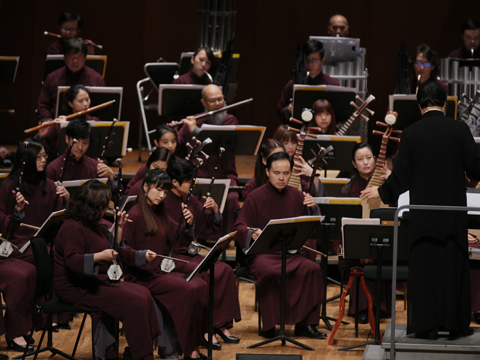
HKCO
Hong Kong Chinese Orchestra Environmental, Social and Governance Artistic Director and Principal Conductor for Life Orchestra Members Council Advisors & Artistic Advisors Council Members Management Team Vacancy Contact Us (Tel: 3185 1600)

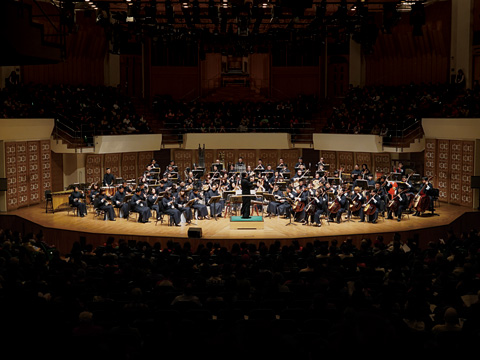
Concerts

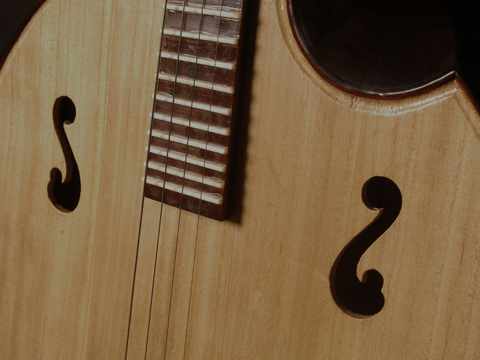
Education
The HKCO Orchestral Academy Hong Kong Youth Zheng Ensemble Hong Kong Young Chinese Orchestra Music Courses Chinese Music Conducting 賽馬會中國音樂教育及推廣計劃 Chinese Music Talent Training Scheme HKJC Chinese Music 360 The International Drum Graded Exam

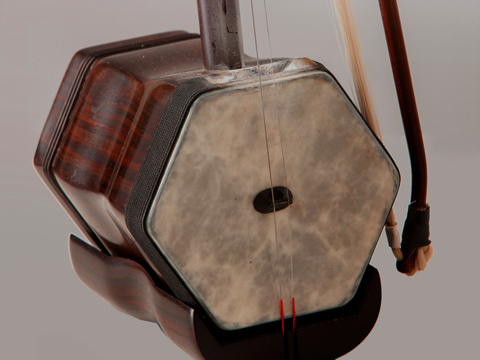
Instrument R&D
Eco-Huqins Chinese Instruments Standard Orchestra Instrument Range Chart and Page Format of the Full Score Configuration of the Orchestra
41st Orchestral Season
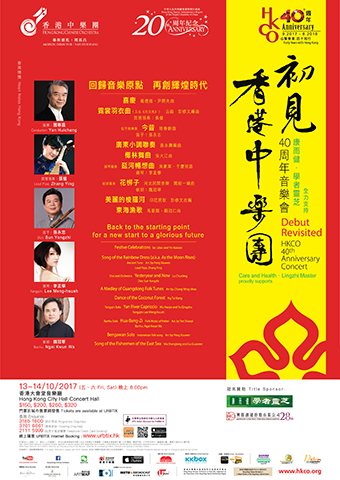
Debut Revisited - HKCO 40th Anniversary Concert
Care and Health.Lingzhi Master proudly supports
Banhu: Ngai Kwun Wa
Lead Pipa: Zhang Ying
Yangqin: Li Meng-hsueh
Back to the starting point for a new start to a glorious future
On 14 October 1977, at the Opening Concert of the 2nd Festival of Asian Arts, the Hong Kong Chinese Orchestra gave its inaugural performance as a professional ensemble, with Founding Director Ng Tai Kong conducting. It marked the beginning of the professionalization of Chinese music in Hong Kong. To commemorate that moving moment, we take you all on a time machine to go back to that concert on that day, via an exact re-run of the programme. Come and share the nostalgic, meaningful experience with us!
Song of the Rainbow Dress (a.k.a. As the Moon Rises) Ancient Tune Arr. by Peng Xiuwen
Lead Pipa: Zhang Ying
Yesteryear and Now Lu Chunling
Dizi: Sun Yongzhi
A Medley of Guangdong Folk Tunes Arr. by Chang Wing-shou
Dance of the Coconut Forest Ng Tai Kong
Yangqin Solo Yen River Capriccio Wu Haoye and Yu Qingzhu
Yangqin: Lee Meng-hsueh
Banhu Solo Hua-Bang-Zi Folk Music of Hebei Arr. by Yan Shaoyi
Banhu: Ngai Kwun Wa
Bengawan Solo Indonesian folk song Arr. by Peng Xiuwen
Song of the Fishermen in the East Sea Ma Shenglong and Gu Guanren
Forty years on since its debut
Chow Fan-fuAt 8 p.m. on 14 October 1977, at the Hong Kong City Hall Concert Hall, the opening programme of the Second Festival of Asian Arts was setting a new milestone for the development of Chinese music in Hong Kong. The Hong Kong Chinese Orchestra, which had just turned professional, was holding its inaugural concert. It signalled an important breakthrough in the history of Chinese music in Hong Kong.
This historic moment was made possible because one year ago, Ng Tai Kong gave a highly impressive performance conducting the Singapore Chinese Orchestra in the First Festival of Asian Arts presented by the Urban Council. It was so impressive that Darwin Chen, Manager of Hong Kong City Hall since 1968, made a proposal to invite Ng back to Hong Kong the following year to helm the preparations for the professionalization of the amateur Hong Kong Chinese Orchestra.
Premiere of Overture deferred
But according to the timeline prescribed by the Urban Council, the entire process was rather rushed. The inaugural concert was scheduled for 14 October, but by the time Ng signed the contract with the Urban Council and began working on the professionalization procedures, it was already June. He had practically only four months’ time for open recruitment and selection of members for the orchestra, setting a timetable for rehearsals and performances, and choosing the concert programme… It was thanks to the dedication and hard work of all those concerned that the orchestra finally emerged with a brand new look on the stage of the Hong Kong City Hall Concert Hall.
I was one of the witnesses to this historic moment as I was among the audience in the packed concert hall. To me, it seemed only yesterday that they gave their debut on that evening - a feeling that I am sure those who were there would share with me. Whether in terms of its size, configuration, stage presence, style, disposition or programme, it was a breakthrough in every aspect. The orchestra consisted of seventy members, with about fifty being full-time. Most were young to early middle-age, but only seven were female. Ng and the orchestral members wore Chinese costumes: the men donned blue robes and the women yellow side-buttoned tops and skirts. All instruments used were traditional Chinese instruments. Even the bass section consisted of gehu and bass gehu (rather than the cello and bass), which gave a unified, ethnic aesthetics to the orchestra.
The opening item on the programme of this inaugural concert was originally planned to be the premiere of Overture “Hong Kong”, written specially for the occasion by Chang Wing-shou. But as there was not enough time for proper rehearsals, its premiere had to be deferred to the Hong Kong Arts Festival the year after. Instead, the full orchestral Festive Celebrations was used. It was a lively and animated piece full of joy and festive ambiance. The powerful brass and percussion sections created an appropriately celebratory mood.
The course of history is never certain
The next item was the ancient Tang Dynasty pipa piece, Song of the Rainbow Dress, with pipa virtuoso, Lam Fung, in the lead. It was played with a classical and lyrical touch. Next was a dizi solo, Lu Chunling’s Yesteryear and Now, by Wong Kuen, which went straight to the heart of the audience.
The last two items before intermission were orchestral music. One was a medley of six Cantonese tunes arranged by Chang Wing-shou, which pleased the audience immensely as they were well-known and much loved; and the other, Dance of the Coconut Forest, written by Ng Tai Kong, was making its Hong Kong debut. The Malay dance rhythms, reinforced by coconut shells used as percussion, gave the piece a distinct exotic appeal and filled the concert hall with the warm and soft ambiance of a Southeast Asian setting.
Yet, the climax of this debut concert was yet to come in the second half of the programme, in the form of four different but equally monumental works: the uplifting Yan River Capriccio, performed by yangqin player Chan Ah-kam; banhu solo piece Hua-Bang-Zi, performed by Wong On-yuen with great virtuosity, insightful
interpretation and stage presence; and the last two pieces to wrap up the concert, the Indonesian ballad, Bengawan Solo, and Song of the Fishermen of the East Sea. The former, a timeless and well-loved song, invoked a light and sweet ambiance with its melody; the latter did justice to the characteristics of a full-scale orchestra. The concertmaster for the evening was erhu virtuoso Tong Leung-tak, who took up the important task only two months into his arrival in Hong Kong, an attestation to his stature. To sum up the general impression of that “debut” performance, it was “love at first sight” as some described it.
Now, forty years later, the soloists, leaders and concertmaster are no longer in the orchestra, and some have even passed on. It is an inevitability of life. If one is to compare this “remake” of the debut concert in various aspects, one cannot but agree with what the programme notes of forty years ago predicted, “it will start a new chapter in the history of modern Chinese music” Having said that, we must note that the course of history could have been quite different. Had there not been the unfailing and warm support of the people who “fell in love at the first sight” forty years ago, and of the numerous others who have stayed with the orchestra all the way, this chapter in history could not have been revived to become a heartwarming revisit down memory lane.
Your Support
Friends of HKCO
Copyright © 2026 HKCO
